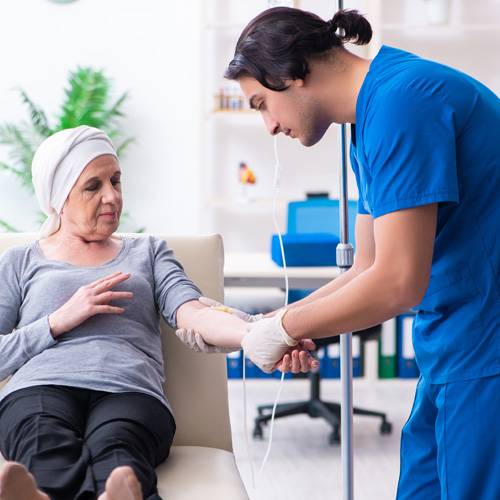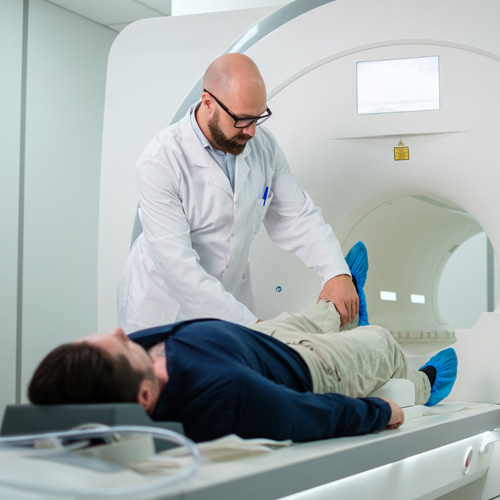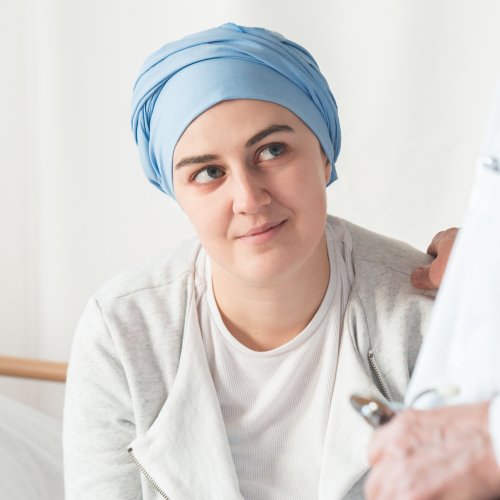The department of Medical Oncology at the Citizens Specialty Hospital is equipped with advanced techniques for diagnosing and treating all types of cancer. At the hospital, extensively experienced oncology specialists perform chemotherapy, immunotherapy, targeted therapy, and hormonal therapy. The department offers the latest medical facilities to monitor the efficacy of the treatment during and after the treatment. In addition, the medical staff develops customized treatment plans catering to the needs of individual patients.
The doctors in the medical oncology department work in coordination with the radiation oncology and surgical oncology department specialists to determine the best medical care for the patient to improve their chances of living a disease-free and longer life.
Radiation therapy is one of the most important treatment options for patients suffering from cancer. The treatment is effective alone or in combination with other procedures, such as chemotherapy or surgery. It involves the use of high-energy radiation that kills cancer cells. The types of radiation used in radiation therapy are x-rays, protons, gamma rays, and electron beams. Depending upon the type and severity of cancer and the patient's overall health, radiation therapy may be internal (brachytherapy) or external (through external beam radiation). During External Beam Radiation Therapy, radiation is delivered to the cancerous site using a machine called Linear Accelerator (LA). The gantry of the machine moves around the body during treatment without touching the patient. Internal radiation therapy (Brachytherapy) involves inserting a radioactive material source, i.e., a seed, wire, catheter, needle, etc., into or near the cancer site for a few minutes.
Our physicians plan meticulously to minimize the chance of any side effects. Our expert team of physicists and dosimetrists ensures complete safety while performing the radiation therapies with highly sophisticated equipment and computers. An oncologist may prescribe radiation therapy before, during, or after surgery, depending on the treatment strategy devised collaboratively by the medical team. Our team of expert oncologists starts the design for each patient’s complete, personalized treatment plan with a simulation. The simulation begins by using detailed imaging scans to determine the location, size, and shape of the tumor in the body.
By choosing our medical oncology services, patients gain access to Chemotherapy, Hormone therapy, Immunotherapy, and Targeted therapy. Our team of medical oncology experts, along with other healthcare professionals always prioritize patient safety and comfort, while administering different types of treatment. They also help in providing moral support to the patients throughout their cancer treatment.
The surgical oncology team at Citizens Specialty Hospital is an expert in performing complex cancer surgeries with a high success rate and minimal complications. The advanced technical equipment supports the medical team in performing the surgery for optimal outcomes. Some of the cancers treated at the department are breast cancer, head and neck cancer, soft tissue sarcomas, stomach cancer, esophageal cancer, lung cancer, colon cancer, rectal cancer, liver cancer, and bone cancer.
Bone marrow, found in the core of long bones, produces essential blood components like white blood cells, red blood cells, and platelets. A bone marrow transplant entails replacing diseased or damaged bone marrow with healthy marrow from the patient or a suitable donor.
Conditions treated through this procedure include various hemato-oncological disorders such as acute lymphoblastic leukemia (ALL), acute myelogenous leukemia (AML), chronic myelogenous leukemia (CML), Hodgkin lymphoma, chronic lymphocytic leukemia (CLL), non-Hodgkin lymphoma (NHL), myeloma, myelodysplastic syndrome, and aplastic anemia.
Paediatric Hemato Oncology & BMT - Bone marrow, found at the core of long bones, is responsible for producing essential components of blood such as white blood cells, red blood cells, and platelets. A bone marrow transplant procedure involves replacing diseased or damaged bone marrow with healthy bone marrow sourced either from the patient's own body or a compatible donor. This treatment method is commonly utilized for children with hemato-oncology disorders.
The range of conditions treated through bone marrow transplants includes various hemato-oncological disorders like acute lymphoblastic leukemia (ALL), acute myelogenous leukemia (AML), chronic myelogenous leukemia (CML), Hodgkin lymphoma, chronic lymphocytic leukemia (CLL), non-Hodgkin lymphoma (NHL), myeloma, lymphoma, myelodysplastic syndrome, and aplastic anemia.
At Citizens Specialty Hospital, we offer highly advanced nuclear medicine diagnostic services to the patients suffering from different types of cancers. Nuclear medicine has both diagnostic and therapeutic purposes.
Our team of nuclear medicine specialists are experts in using imaging studies to identify the abnormal cancer cells, in the early stages of the disease. Positron Emission Tomography (PET) scans, a type of advanced imaging studies, are used, by the doctors to precisely identify the tumors in the body of the cancer patients. Radioisotopes or radio-pharmaceuticals are administered into the patient’s body through an Intravenous (IV) cannula. A set of nuclear reactions occur inside the body, after absorption of the radioisotope drugs, which gives a detailed view of the internal organs and tissues.
One of the main advantages of this process of diagnosis is that it helps in detailed analysis of the functioning of the organs, the growth of cancer cells, tissues, or structures, and helps to decide the further course of treatment.
Pain management is a specialized medical field dedicated to diagnosing, evaluating, and treating various forms of pain with the primary objective of reducing or controlling pain levels to enhance quality of life and restore functional capabilities.
Pain is typically categorized as either acute or chronic. Acute pain arises suddenly from factors such as injury, surgery, or illness and generally subsides as the underlying cause heals. Conversely, chronic pain persists for extended periods, often exceeding three months, and can stem from conditions like arthritis, neuropathy, fibromyalgia, or spinal issues.
The approach to pain management commonly involves a collaborative team of healthcare professionals, including anesthesiologists, neurologists, orthopedic specialists, physiatrists, physical therapists, psychologists/psychiatrists, and pharmacists. By working together, this multidisciplinary team delivers personalized care to address the unique needs of each patient.
Doctors & Trained Staff
Term Of Specialists
Patients From More Than 5 Countries
OT Departments
Our Blogs will keep you updated with the latest news,
campaigns, health and wellness updates you should know.











